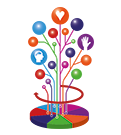USING TED TALKS
[1] AN IMPORTANT PROVISO: creating awareness through ted talks
The 3rd edition of the Skill Sheets introduces TED Talks as an excellent formula to make great speeches (-> F1, p.325). But TED Talks are also a great way of getting information and as a means of self-reinforcement and empowerment (àThe Format, p.28-29). It is important, however, to understand that TED Talks primarily represent one layer of skill formation: that of understanding. Understanding is one of the lower layers of the so-called (revised) Bloom Taxonomy, which represents a hierarchy of educational objectives., A hierarchy of ICT literacy exists, in which different sorts of ICT sources can be linked to specific functions of your skill profile. This ranges from relatively simple ICT sources that help you remember, to more research oriented tools that help you in doing research and creating new information. There are various ways of interpreting what you can do with specific ICT tools (see box). Googling and other search engines provide tools for quick searching and in particular ‘outsourcing remembering’. You don’t need to actively remember everything yourself, because you can find it on internet (-> Skill Sheets A20-A22 for tips on how to use this layer more effectively). More advanced skills like analyzing, evaluating and creating are linked to tools like Wikipedia, Google scholar or interactive sites like Wikispaces that help you in the creation of active (creative) communities
TED Talks have to be positioned at the lower levels of the ICT Literacy hierarchy, related to ‘remembering’ or ‘understanding’ (box). This is due to the TED Talks formula. They are organized in a way that makes it very attractive to plug into the insights of many great thought-leaders (often scholars presenting deep thoughts in around 12 minutes), but they still leave you unguided on how to use these insights. The Skill Sheets formula has been created to help you further. TED Talks are awareness raising, provide you with intriguing questions, provide some answers and direction and are a resource of great presentations. They can trigger your reflective cycles on almost all related skills. Other ICT sources are linked with different levels of literacy and consequently related to a different phase in the reflective cycle.
Sources: JISC Design Studio, Digital Pedagoger
So:
- use TED Talks – or related talks with the same formula - as general input for specific Skills;
- use them as a great resource of inspirational, and often well-founded, insights;
- and as stimulus to read further: the transcripts that are often provided are worth reading and re-reading;
- but understand that they present a specific type of argument, and in case the argument is based on solid research – which is often the case – go to the original source – a book, a paper – and read further.
[2] GREAT “TED TALKS” as input for Skill
1. Ken Robinson: Do schools kill creativity (2007)?
2. Jason Luis Silva (not a TED Talk) the impact of flow (and many other clips that are inspiring and though provoking). Itstarted in 2013 a youtube channel ‘shots of awe’’, presenting weekly micro-documentaries on creativity, innovation and more.

